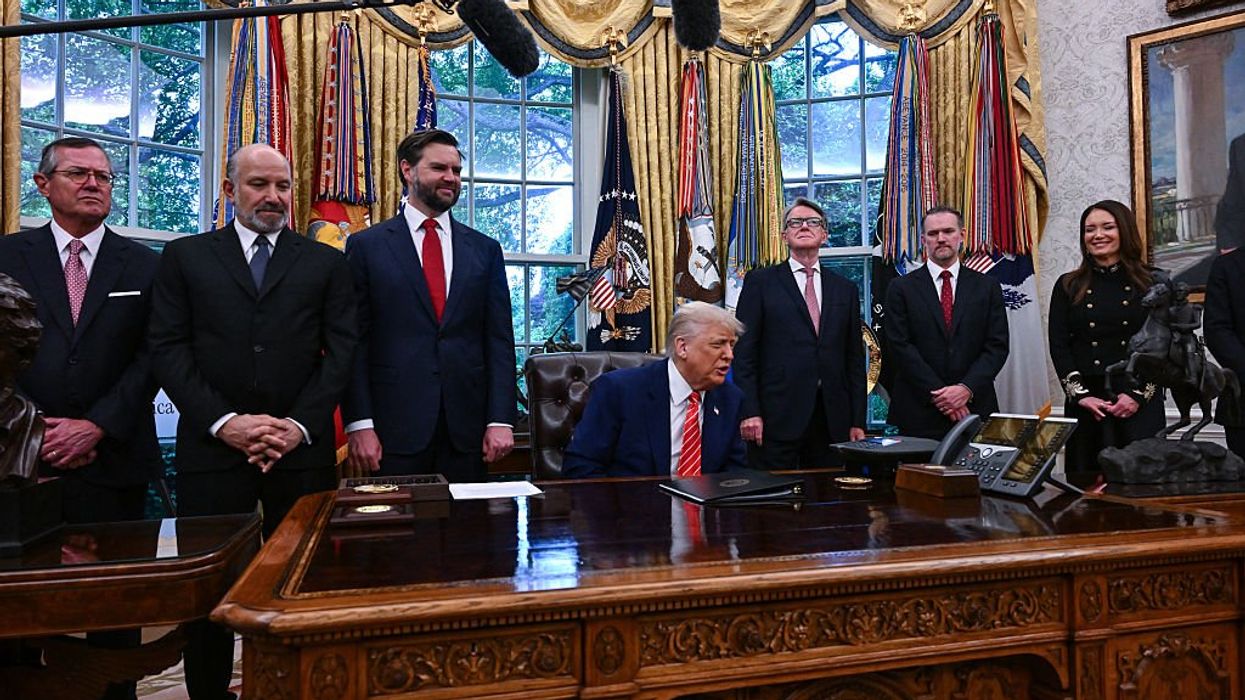
Photo by Ricky Carioti/The Washington Post via Getty Images

The free trade brigade wants cheap goods. Trump wants a strong nation. You can’t have both when global competitors don’t play by the same rules.
President Trump on Thursday announced a new tariff deal with the United Kingdom — the first major agreement to follow the “Liberation Day” tariffs that forced 90 countries to come crawling back to the negotiating table.
Earlier in the week, India offered a zero-for-zero tariff deal — free trade on pharmaceuticals, steel, and auto parts. Trump declined.
America doesn’t just need tariffs to protect jobs and industries. It needs them to defend its sovereignty.
Predictably, the free-trade faithful slammed the U.S.-U.K. deal as “managed trade” that would harm consumers. They rushed to embrace India’s offer instead. They’ve got it backward.
Trump’s “managed trade” with the U.K. will do more to strengthen America’s economy — and serve American workers — than any so-called “free trade” agreement with India. Why? Because developed and developing nations operate in fundamentally different economic worlds. One-size-fits-all trade policy doesn’t work.
This may offend professional economists who worship the rational-consumer model, but it must be said: Different countries are different. These aren’t surface-level quirks. They reshape the entire trade equation and make real free trade — not just difficult — but impossible.
Start with wages. In 2024, the median American worker earned $61,984. The median Briton earned $47,162 — both figures in U.S. dollars for easy comparison. The U.K. lags behind but not by much. If the U.K. were a U.S. state, it would rank somewhere in the middle. Free trade with the U.K. won’t trigger mass offshoring because our labor markets are comparable.
India is a different story. The median Indian worker earned just $3,925 last year. For the price of one American, a company could hire 16 Indians. That wage gap makes offshoring to India almost inevitable in labor-intensive industries. Cheap labor wins.
But wages aren’t the only issue. Legal systems, tax regimes, geography, infrastructure, language, climate, cultural norms, business ethics, and demographics all create market asymmetries that domestic policy can’t overcome.
Take China. American companies operating there face rampant intellectual property theft. Westerners assume legal systems deter crimes like fraud and theft. In reality, cultural norms prevent most bad behavior long before the courts get involved.
China doesn’t share America’s cultural regard for property rights — especially when it comes to outsiders. Since 2001, China has stolen an estimated $5 trillion in American intellectual property. Chinese courts have refused to hold anyone accountable. This isn’t an exception. It’s standard practice.
Doing business in China isn’t like doing business in America, Canada, Australia, or Europe — where common values and legal recourse create a relatively level playing field.
Free-trade advocates can slash tariffs and harmonize regulations all they want, but they can’t fix these deeper, structural imbalances. They can’t rewrite culture or eliminate corruption. These asymmetries make truly free trade impossible.
In my book “Reshore: How Tariffs Will Bring Our Jobs Home and Revive the American Dream,” I argue that American workers are among the most productive in the world — more productive than their counterparts in Germany, Mexico, or almost anywhere else.
That’s why the U.S. typically runs trade surpluses — or small deficits — with developed countries like the Netherlands, Australia, and the U.K.
So why do highly productive American factories shut down and relocate to China, Mexico, or India — where it takes more labor to produce the same output?
Because productivity doesn’t equal price.
The price of a good reflects more than just labor. If a Chinese manufacturer steals its technology instead of inventing it, it can undercut American competitors who spent years funding research and development.
That’s not a free market. It’s rigged.
Global free trade is a myth. Nations can’t trade freely while market asymmetries persist. The only way to achieve true parity would be to unify the world’s economies, legal systems, cultures, and political structures. That’s the goal of the European Union, World Trade Organization, and World Economic Forum. Coincidence? Hardly.
America doesn’t just need tariffs to protect jobs and industries. It needs them to defend its sovereignty. Globalism doesn’t level the playing field — it sells it to the lowest bidder.
Spencer P. Morrison